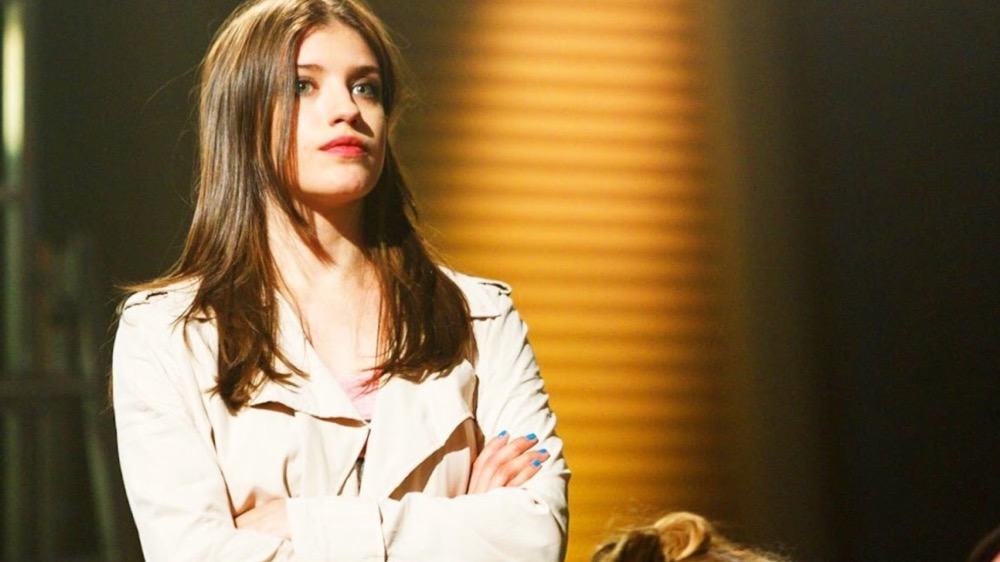In life, you don’t get the future you deserve, but the one that resembles you the most.
At least, that’s the philosophy espoused by one of the protagonists of Blockbuster, a new Russian film, written and directed by Roman Volubuev.
I think we’ve all felt at some point or other, that life, in its twists and turns doesn’t always turn out quite like we may have planned. This cute and quaintly charming Russian film has a lot of life mentoring and contemporary philosophy to dispense, amidst its sleek, modern aesthetic. It might be just what you need to get a fresh perspective on the world, if you’ve found yourself like the protagonists of this film in a bit of a rut lately.
When Liza Nifontova, a female newsreader working in a toxic misogynist environment accidentally crosses paths with Natasha Tulpanova, a small town girl with aspirations to be a model (balaclava clad, having decided to rob a bank to fund her modelling career); the result is a romping modern Thelma and Louise of female re-empowerment, fun and humour, that makes for a lightly pleasant watch.
Svetlana Ustinova and Anna Chipovskaya are wonderful as the unlikely partners in crime, who from the outset capture our empathy as the downtrodden of the world, making a gleeful comeback. We are thrown into Liza’s world, of television and media deception, and amidst the humour of moments (such as Liza, having just had her arse slapped by her misogynist boss, and noting that her ‘face is shiny’) – the film also gives real insights into television which resemble the commentary of shows like UnREAL – the juxtaposition of what happens on and off screen, and the awkward secret happenings when the cameras are switched off. Natasha then enters Liza’s life, like a balaclava wearing tornado, kidnapping her and dragging her into her crime spree, in her signature non-chalance (inappropriately checking her Facebook as they are about to be busted). Natasha and Liza soon start to empower one another, rejuvenating their own youthful spark, mocking each other’s deadbeat boyfriends and getting up to wholesome amounts of mischief.
The style, soundtrack and camera work of this film feel uniquely Russian, whilst at the same time there are obvious visual debts in Volubuev’s directing. Scenes like Natasha and Liza singing along to Russian pop music as they drive, gives a genuine feeling of youth and living in Russia. Whilst the retro-colour-filters feel very much of the age, interesting cuts and editing choices display influences from Jean Luc Goddard and the French New Wave, to Tarantino and his preference for pulp fiction chapter headings; ‘CHAPTER 3 IN WHICH LISA MEETS HER DESTINY’; these fun narrative break-ups almost resemble the ad hoc experimentation of Tarantino derivative films of the 1990’s, like Go (1999).

The cinematography is sometimes dark, with patterns of coloured filters changing like a lava lamp, soft cold tones and unexpected stylistic graphic overlays. Blockbuster plays with Modern American and French techniques too, and obviously owes a debt to directors like Jean-Pierre Jeunet, with Natasha simultaneously mimicking the film‘s French romantic leanings, dreaming of a boyfriend who will take her to Paris.
There are also some interesting musical choices, combining synth with classical pieces such as Tchaikovsky’s Swan Lake, that sometimes evokes cartooniness.
As the story plays out and the film heads through its unpredictable twists and turns, the thematic crux of the film is fleshed out in a satisfying way, not frequently experienced in recent cinema. As Liza returns to work, Natasha visits at her set, providing a neat double critique of each other’s life choices; Liza having spent so long criticising Natasha as a thug, Natasha now challenges Liza’s spineless tendency to accept the chauvinist world she is trapped in. Natasha speaks on live TV in a fantastic moment towards the climax, decrying; ‘the system where women are judged by their tits and men by their wallets’.
As a police officer slowly unravels the truth of Liza’s involvement with Natasha, the central statement is underlined in black and white, examining yet another relationship built off collective bargaining; ‘We’ll both sell our stories and youll write a book. It will be a blockbuster’… ‘Only movies are blockbusters’ the officer says critically. This seems to be a statement directly from Volubuev, that the entire premise of the film is purely fictitious and sensationalised, a parody of Western and Hollywood cinema.
The end of the film is entirely cartoony, with the revelation that the story is being written and the ending is re-written revelling in a typical hollywood climax.
The ambiguous statements at the end of the film, like the throwaway line ‘hard to say what the message is here’ and the final chapter titles thrown onscreen ‘EPILOGUE FOR THOSE WHO WANT TO KNOW WHAT HAPPENED AFTER THE MOVIE ENDED’ – do create a mild anti-climax to the central drama of the story, however this is such a light-hearted, easy-going experience, in the end it is the fact that this movie doesn’t take itself too seriously that makes it precisely so charming.
Fun Fact:
Roman Volubuev, as well as being an actor and writer before directing, was also once a film critic for the influential Russian magazine ‘Afisha’ and a former editor-in-chief of the Russian edition of Empire film magazine.
Blockbuster is screening as part of the 2017 Russian Resurrection Film Festival across Australia. Click here to view the lineup of films and book tickets for your city.




COMMENTS